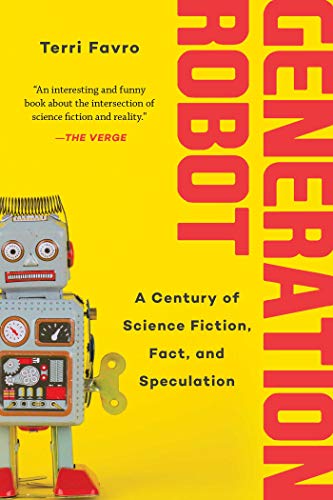
![]() Generation Robot: A Century of Science Fiction, Fact, and Speculation by Terri Favro
Generation Robot: A Century of Science Fiction, Fact, and Speculation by Terri Favro
In Generation Robot: A Century of Science Fiction, Fact, and Speculation (2019), Terri Favro mixes journalistic research, speculative fiction, and memoir, along with a series of pop culture sidebars to create an engaging if sometimes frustrating look at the history of technology that led to our current hopes for true AI and Jetson-like robot.
Favro uses a relatively broad definition of “robot,” which I confess threw me a bit now and then, though it was easy enough to recalibrate my own pre-conceived concept and go along as she looked at driverless cars, smart refrigerators, and even elevators. Those looking for the more narrow and probably more typical sort of robot needn’t worry, though. Favro hits those as well, particularly in the latter chapters (including one on sex robots).
The memoir strand is particularly strong early on in Generation Robot, especially as Favro details her father’s various DIY efforts to add some creative convenience to his life via technology, including a “automated wine bottling system” and a self-guided lawn mower. Most poignant, though, was his ingenious construction of an elevator that allowed his elderly and wheelchair-bound mother to go outdoors after being restricted for years to the interior of the house. Later personal stories are less affective, but often add some humor if not insight, as when Favro is told to write advertising copy about computers/word processing longhand.
The journalistic aspect is mostly well done, especially in her interviews with those heavily involved in driverless cars (she gets to ride in one around a test track), AI, and yes, sex robots. On the other hand, there are some mystifying errors as when she confuses Joseph Campbell and John W. Campbell or incorrectly summarizes the Star Trek episode “The Cage.”
The speculative fiction parts arise as Favro imagines herself interacting with some future technology, an older self with a robot personal trainer or an even older (thanks to futuristic bio-tech and medicine) cranky woman complaining about a human-robot marriage in her family. These fictional interludes more than the other strands are going to depend on readers’ individual tastes. They were pretty hit and miss for me.
I can’t say I learned much new from Generation Robot. Some information is well-trod by now, such as Steve Jobs’ inspiration from his tour of the Xerox lab, while others, such as the benefits of autonomous cars or the progression in AI from victories in chess to Go to poker will be familiar to anyone who reads much contemporary journalism about technology. That said, Favro presents an easy to follow, entertaining, engaging, and moderately informative exploration of the topic, nicely spiced with some more poignant or highly personal stories. Recommended.



This seems to go well thematically with the book Kat reviewed today!